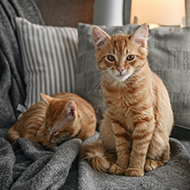Environmental contaminants negatively effect cat health

Researchers found a significant negative correlation between thyroid hormones and organohalogen compounds.
A study led by researchers from Ehime University, Japan, has evaluated the effects of environmental contaminants on pet cat health, as reported by Science Daily.
Researchers investigated the potential health effects caused by persistent organic pollutants exposure in pet cats, finding that this can lower blood thyroid hormone levels and cause chronic oxidative stress.
These organic pollutants, known as organohalogen compounds (OHCs), are human-made chemicals containing chlorine, bromine and fluorine atoms. These are found in some pharmaceuticals, industrial fluids, electrical applications, paint additives, food packaging and many pesticides.
With the close contact pet cats share with human environments, the potential health effects of harmful substances on them is something scientists are concerned with.
For this study, researchers collected blood from pet cats and analysed their contamination status – finding that a high level of exposure to OHCs correlated significantly with the thyroid hormone homeostasis, chronic oxidative stress and metabolic diseases.
Those researching the effects of these environmental contaminants on pet cat health have concluded that providing companion animals with an environment featuring low exposure to OHCs is an important factor in considering pet welfare. With reducing the OHC contained in the pet's indoor environment and pet food considered a 'necessity'.
As stated in the Science Daily report, is: “it is essential to clarify the toxic effects of various pollutants on pet cats.”



 The RCVS has announced a new version of its 1CPD mobile app, with enhanced features for veterinary surgeons and veterinary nurses to record their continuing professional development.
The RCVS has announced a new version of its 1CPD mobile app, with enhanced features for veterinary surgeons and veterinary nurses to record their continuing professional development.